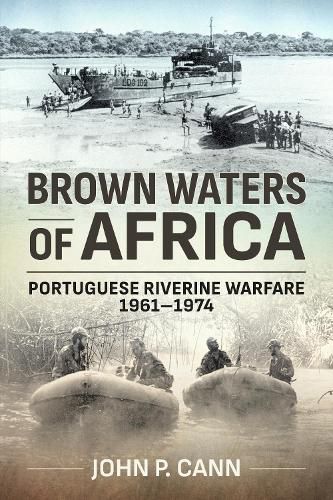Readings Newsletter
Become a Readings Member to make your shopping experience even easier.
Sign in or sign up for free!
You’re not far away from qualifying for FREE standard shipping within Australia
You’ve qualified for FREE standard shipping within Australia
The cart is loading…






During World War II, Portugal played its cards uncommonly well as a neutral and subsequently became a member of NATO. This membership resulted in a modernising of its navy and its integration into the Atlantic Alliance. By 1960, when other colonial powers were abandoning their empires, Portugal made the decision to cling to its possessions, as they had been Portuguese for over 400 years. Without them Portugal saw itself as only a small European country, whereas with them, it would be a great nation. Portugal ultimately would fight a 13-year debilitating war against various nationalist movements in Africa to retain its possessions. By the mid-1950s, it became apparent to the Portuguese Navy that it would fight in Africa, and it began to make preparations. Ultimately, it would perform a near wholesale conversion from the blue water or oceanic navy that supported NATO to a brown water or riverine one to fight in Africa. This is the story of that conversion and the great battle of the rivers in Africa. This naval reorientation was a remarkable achievement, in that Portugal not only learned to fight a new kind of war, it built a navy to accomplish this and did so while shouldering its NATO commitments. The Portuguese Navy in developing a specialised naval force clearly foresaw the paramount economic, military, and psychological importance of controlling the interior waterways of Africa, for the infrastructure there was universally primitive. While there was generally a road network radiating from the colonial capital, the primary routes used clandestinely by insurgents were chiefly the waterways. The lessons from this experience tend to be forgotten, as this war was overshadowed by the U.S. conflict in Vietnam. Today, however, riverine operations are experiencing a renaissance in reaction to the war of the weak. While modern boats are more technologically advanced, and their crews use newer and better equipment and weapons, the problems and their solutions remain largely the same. The operating environment remains the rivers, bayous, salt pans, canals, lakes, and deltas extending inland from the coast. The population remains a vulnerable target, and the need to establish a permissive environment continues as the primary goal. Clearly, the legacy of the Portuguese ‘brown water navy’ remains relevant today.
$9.00 standard shipping within Australia
FREE standard shipping within Australia for orders over $100.00
Express & International shipping calculated at checkout
During World War II, Portugal played its cards uncommonly well as a neutral and subsequently became a member of NATO. This membership resulted in a modernising of its navy and its integration into the Atlantic Alliance. By 1960, when other colonial powers were abandoning their empires, Portugal made the decision to cling to its possessions, as they had been Portuguese for over 400 years. Without them Portugal saw itself as only a small European country, whereas with them, it would be a great nation. Portugal ultimately would fight a 13-year debilitating war against various nationalist movements in Africa to retain its possessions. By the mid-1950s, it became apparent to the Portuguese Navy that it would fight in Africa, and it began to make preparations. Ultimately, it would perform a near wholesale conversion from the blue water or oceanic navy that supported NATO to a brown water or riverine one to fight in Africa. This is the story of that conversion and the great battle of the rivers in Africa. This naval reorientation was a remarkable achievement, in that Portugal not only learned to fight a new kind of war, it built a navy to accomplish this and did so while shouldering its NATO commitments. The Portuguese Navy in developing a specialised naval force clearly foresaw the paramount economic, military, and psychological importance of controlling the interior waterways of Africa, for the infrastructure there was universally primitive. While there was generally a road network radiating from the colonial capital, the primary routes used clandestinely by insurgents were chiefly the waterways. The lessons from this experience tend to be forgotten, as this war was overshadowed by the U.S. conflict in Vietnam. Today, however, riverine operations are experiencing a renaissance in reaction to the war of the weak. While modern boats are more technologically advanced, and their crews use newer and better equipment and weapons, the problems and their solutions remain largely the same. The operating environment remains the rivers, bayous, salt pans, canals, lakes, and deltas extending inland from the coast. The population remains a vulnerable target, and the need to establish a permissive environment continues as the primary goal. Clearly, the legacy of the Portuguese ‘brown water navy’ remains relevant today.